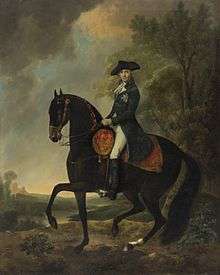Prince Henry, Duke of Cumberland and Strathearn
| Prince Henry | |
|---|---|
| Duke of Cumberland and Strathearn | |
 The Duke of Cumberland, as painted by Thomas Gainsborough, 1777 | |
| Born |
7 November 1745 Leicester House, London |
| Died |
18 September 1790 (aged 44) London |
| Spouse | Anne Horton |
| House | Hanover |
| Father | Frederick, Prince of Wales |
| Mother | Princess Augusta of Saxe-Gotha |
Prince Henry, Duke of Cumberland and Strathearn (Henry Frederick;[1] 7 November 1745 – 18 September 1790) was the sixth child and fourth son of Frederick, Prince of Wales and Augusta of Saxe-Gotha, and a younger brother of George III. His 1771 marriage to a commoner against the King's wishes prompted the Royal Marriages Act of 1772 .
Early life

Prince Henry of Wales was born on 7 November 1745 at Leicester House, London to Frederick, Prince of Wales, son of George II and Caroline of Ansbach, and his wife The Princess of Wales. He was christened at Leicester House twenty-three days later.[2]
Royal Dukedom

On 22 October 1766,[3] just prior to his twenty-first birthday, the prince was created Duke of Cumberland and Strathearn and Earl of Dublin.
Allegations
On 4 March 1767, the Duke of Cumberland allegedly married Olive Wilmot (later Mrs Payne), a commoner, in a secret ceremony. There reportedly was one child, Olivia Wilmot (1772–1834), from this relationship, though the duke's paternity was never proven, and Olivia Wilmot was accused of forging the evidence. A landscape painter and novelist, Olivia Wilmot married John Thomas Serres (1759–1825) and later, controversially, assumed the title of "Princess Olivia of Cumberland".
In 1769, the Duke of Cumberland was sued by Lord Grosvenor for "criminal conversation" (that is, adultery) after the Duke and Lady Grosvenor were discovered in flagrante delicto.[4] Lord Grosvenor was awarded damages of £10,000, which together with costs amounted to an award of £13,000 (equivalent to £1,630,000 in 2015).[5]
Royal Navy
In 1768, at the fairly late age of 22, the Duke entered the Royal Navy as a midshipman and was sent to Corsica in HMS Venus. However, he returned in September when the ship was recalled following the French invasion of the Corsican Republic. He was promoted to Rear-Admiral the following year and Vice-Admiral in 1770.[6]
Marriage
The Duke's marriage to a commoner, the widow Anne Horton (or Houghton) (1743–1808), on 2 October 1771 caused a rift with the King and was the catalyst for the Royal Marriages Act 1772, which forbids any descendant of George II to marry without the monarch's permission. There were no children from this marriage. Anne, though from a noble family – she was a daughter of Simon Luttrell, 1st Earl of Carhampton, and the widow of Christopher Horton of Catton Hall – seems to have been rather loose with her favours, given one wag's comment that she was "the Duke of Grafton's Mrs Houghton, the Duke of Dorset's Mrs Houghton, everyone's Mrs Houghton."[7]
The marriage between Anne Horton and the Duke of Cumberland was described as a “conquest at Brighthelmstone” (now Brighton) by Mrs. Horton, "who", Horace Walpole says, "had for many months been dallying with his passion, till she had fixed him to more serious views than he had intended."[8] Anne was however generally thought one of the great beauties of the age, and Thomas Gainsborough painted her several times.
Later life
In 1775, the Duke established the Cumberland Fleet, which would later become the Royal Thames Yacht Club. He was promoted Admiral in 1778, though he was forbidden from assuming any command.[6] The Duke was also instrumental in the development of Brighton as a popular resort. He had first visited in 1771, and in 1783, the Prince of Wales visited his uncle there.
The Duke of Cumberland died in London on 18 September 1790. His widow died in 1808.
Titles, styles, honours and arms
Titles
- 7 November 1745 – 22 October 1766: His Royal Highness Prince Henry[1]
- 22 October 1766 – 18 September 1790: His Royal Highness The Duke of Cumberland and Strathearn
The prince's full style, as recited by Garter King of Arms at his funeral, was the "Most High, Most Mighty and Illustrious Prince Henry Frederick, Duke of Cumberland and Strathearn, Earl of Dublin, Knight of the Most Noble Order of the Garter".[9]
Arms
Henry was granted use of the arms of the kingdom, differenced by a label argent of five points, the centre bearing a cross gules, the other points each bearing a fleur-de-lys azure.[10]
Ancestors
References
Citations
- 1 2 He is called simply "(His Royal Highness) Prince Henry" in the London Gazette 8 September 1761; 25 May; 28 December 1765; 14 December 1771
- ↑ Yvonne's Royalty Home Page: Royal Christenings
- ↑ Yvonne's Royalty: Peerage
- ↑ Stella Tillyard (2010). A Royal Affair: George III and His Troublesome Siblings. Random House. pp. 169–175. ISBN 1-4090-1769-9.
- ↑ UK CPI inflation numbers based on data available from Gregory Clark (2016), "The Annual RPI and Average Earnings for Britain, 1209 to Present (New Series)" MeasuringWorth.
- 1 2 The Oxford Dictionary of National Biography
- ↑ Walpole, Horace. Memoirs and Portraits, 195.
- ↑ Walpole, Horace. Memoirs and Portraits, 244.
- ↑ The London Gazette: no. 13241. p. 598. 2 October 1790.
- ↑ Marks of Cadency in the British Royal Family
External links
| Prince Henry, Duke of Cumberland and Strathearn Cadet branch of the House of Welf Born: 7 November 1745 Died: 18 September 1790 | ||
| Masonic offices | ||
|---|---|---|
| Preceded by The Duke of Manchester |
Grand Master of the Premier Grand Lodge of England 1782–1790 |
Succeeded by The Earl of Moira (as Acting Grand Master) |
.svg.png)